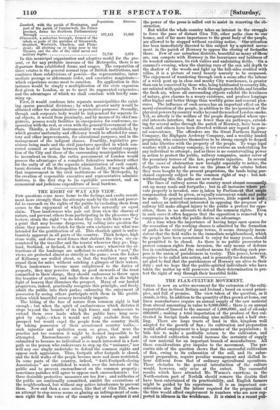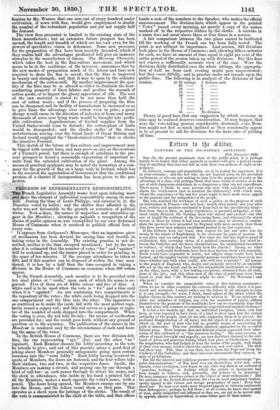TICE FLAX-CULTTTRE MOVEMENT.
THERE is now an active movement for the extension of the culti- vation of flax in Great Britain and Ireland ; based on sound princi- ples, and full of promise. The view taken of the question, as it stands, is this. In addition to the quantity of flax grown at home, our linen manufactures require an annual supply of the raw material from abroad amounting in -value to 8,000,0001.; there is an annual importation of linseed to the amount of 1,000,000/., and of oil-cake 600,0001.; making a total importation of the produce of flax cul- tivated in foreign lands exceeding nine millions and a half star- ling. There are large tracts of land in this kingdom well adapted for the groh of flax ; its cultivation and preparation would afford employment to a large number of the population; it bids fair to make a profitable return to the cultivator, and its extended cultivation would increase the certainty of supply of raw material for an important branch of manufactures. All these considerations give impulse to the movement. The per- contra side of the question shows that the successful cultivation of flax, owing to its exhaustion of the soil, and its subse- quent preparation, require peculiar management and skilled la- bour different from that of ordinary agricultural operations. These obstacles to the general introduction of the culture would, however, only arise at the outset. The successful results which have attended Mr. Warnes's exertions in the North-eastern part of Norfolk should remove the doubts that have been entertained of its practicability, and English farmers might be guided by his experience. It is an important con- sideration also that the labour required for the preparation of the fibre would afford employment to numbers who are now sup- ported in idleness in the workhouse. It is stated in a resent pub-
lication by Mr. Warnes that one acre out of every hundred under cultivation, if sown with flax, would give employment to double the number of the redundant population and yet not supply half the demand.
The view thus presented is limited to the existing state of the linen manufacture ; but an extensive future prospect has been opened, the length and breadth of which are too vast even for the powers of speculative vision to determine. Some new processes tor the preparation of flax have been recently invented, which if they realize half the advantages predicated will give an immense stimulus to the manufacture of linens. The Morning Chronicle, which takes the lead in the flax-culture movement, and Which seems to be in the confidence of the inventor, announces that by the new modes of preparation much of the labour and time now required to dress the flax is saved ; that the fibre is improved in beauty and strength • and that it may be spun by the ordinary
• mechanism of the cotton-mill. By another improvement the qua- lity of the fibre may be so altered as either to diminish the heat- conducting property of linen fabrics and produce the warmth of cotton goods, or to impart the glossy appearance of silk. The cost of the raw material is stated to be not more than half the -cost of cotton wools ; and if the process of preparing the fibre can be cheapened and its facility of manufacture be increased so as to give linen the advantage over cotton even in price, a great change would ensue in the direction of industry at home and many thousands of acres now lying waste would be brought into profit- able cultivation. Apprehensions of limited supplies from the United States would cease to disturb ; the cotton-plant of India would be disregarded ; and the slender stalks of the linum usitatissimurn waving over the broad lands of Great Britain and Ireland would supplant the "blood-stained cotton" that so shocks the45nsitive Ferrand.
This sketch of the future of flax-culture and improvement may be tinged with roseate hues and may prove as airy as the creations of al‘urner's pencil, but there is enough of substance in the pre- sent prospect to found a reasonable expectation of important re-
4 suits from the extended cultivation of the plant Among the means of practical appliance may be noted the formation of a com- pany for the growth of flax on a large scale in Ireland, -which has so far received the approbation of Government that the conditional promise of a charter of incorporation has been given to the pro- moters.



























 Previous page
Previous page